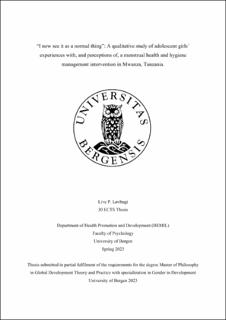| dc.description.abstract | Background: The topic of menstruation is gaining attention within the development field and several Menstrual, Sexual, and Reproductive Health (MSRH) interventions have been implemented across Sub-Saharan Africa, with goals of ending period poverty, fighting school absenteeism, and increasing quality of life for menstruators. However, when evaluating these interventions, some factors are usually left out. Most evaluations are quantitative, and the menstruators own experiences tend to be ignored. Additionally, few evaluate the acceptability of the intervention. Therefore, the aim of this thesis was to explore the girls´ own experiences with a MSRH intervention. Methods: The method used in this thesis was in-depth interviews in pairs, interviewing a total of 14 participants on their experiences with the Partnering to Support Schools to Promote Good Menstrual Health and Well Being (PASS MHW) intervention, which was implemented in secondary schools in the Mwanza region in Tanzania. Findings: Most participants had knowledge about menstruation before reaching menarche, gained from their mother or sister. Fear was the primary feeling towards reaching menarche, with worry around pain, how to handle their menses, and what consequences would follow. The few who felt okay reaching menarche felt so due to their knowledge on the topic. Being open about menstruation was hard for several of the participants, especially with friends or classmates. Most participants used cloths or pads, while not expressing much positivity towards any of them. The intervention consisted of MSRH education, focusing on the importance of hygiene and staying clean, a sanitary kit with reusable sanitary pads and menstrual cup, and an instruction book. All preferred the sanitary pads, while only one participant liked both the pads and the menstrual cup. The rest were negative towards the menstrual cup, with fear of pain, confusion of usage and washing, the loss of virginity being mentioned. The sanitary pads were reported as easy to understand, comfortable and free of worries. All expressed feeling more comfortable, open and confident than before the intervention, having learned about their bodies, how to cope with their menses, pain management, and risks of sexual intercourse. Some knowledge gaps seem to remain, especially linked to how to track their menstruation and flow, and wash and use of products. Conclusion: There was higher acceptability of sanitary pads than menstrual cups. The educational component is important and was valued by the participants. The participants reported a change in attitudes, from negativity earlier, to positivity in the present. Recommendations include evaluation of menstrual cup distribution, establishment of peer support systems, and working towards more accessible MSRH education in schools. | |
